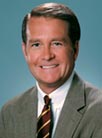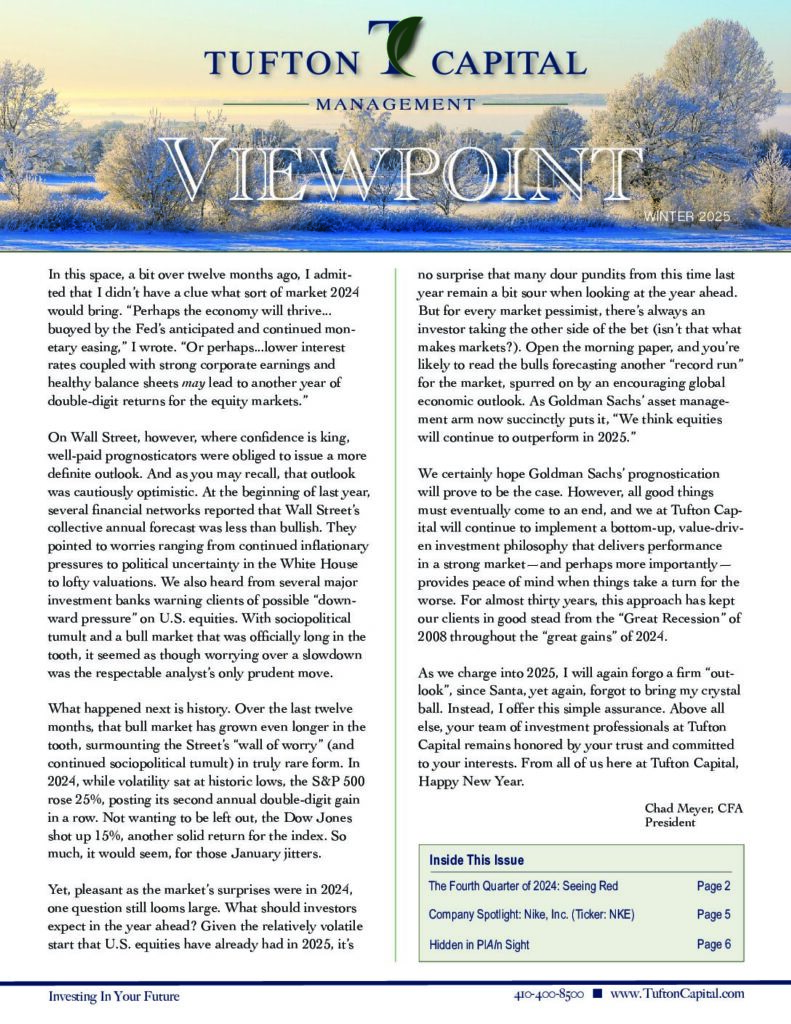 Pssst… if ever you have the chance to hear Stuart Varney speak, grab it! Emblematic of the “coat hangers” in our respective mouths, wife Kirby and I were presented that opportunity back in November by way of The Fund for American Studies’ 2010 Leadership Network.
Pssst… if ever you have the chance to hear Stuart Varney speak, grab it! Emblematic of the “coat hangers” in our respective mouths, wife Kirby and I were presented that opportunity back in November by way of The Fund for American Studies’ 2010 Leadership Network.
For those unfamiliar with the gentleman, he may be found daily serving as the anchor of Fox Business News’ morning show, Varney & Company… for those of you groaning at the mere mention of the word Fox, relax, Stuart has logged time with both CNN and CNBC. In fact, with Larry King’s recent retirement, Varney may be the dean of cable news hosts, having joined CNN’s Manhattan bureau at its genesis back in 1980. A graduate of the London School of Economics, his coverage of the 1987 stock market crash earned him the coveted Peabody Award for excellence in journalism. (more…)
One, two, three, four…
Hrmm!
One, two, (one, two, three, four!)
1966… The Beatles—most of my partners are way too young to remember the phenomenon they were, and the others were on to more serious things. For those of you of a certain age though, do you remember the song to which that count was the opening?
Let me tell you how it will be;
There’s one for you, nineteen for me.
‘Cause I’m the taxman,
Yeah, I’m the taxman. (more…)
Investment Income—The Growing Problem
 With bond and money market yields near all-time lows, investors who are trying to generate income feel like they are swimming upstream. Until recently, investors could always count on the bond market to provide them with a steady stream of consistent income. Yields were reasonably competitive, which made it easier for investors to live off of their investment income. The U. S. financial crisis and subsequent recession pushed interest rates to historically low levels.
With bond and money market yields near all-time lows, investors who are trying to generate income feel like they are swimming upstream. Until recently, investors could always count on the bond market to provide them with a steady stream of consistent income. Yields were reasonably competitive, which made it easier for investors to live off of their investment income. The U. S. financial crisis and subsequent recession pushed interest rates to historically low levels.
During this difficult period, however, investors could still manage to find competitive yields, as risk was still rampant. For example, there was a period of time in late 2008 and early 2009 when the consensus view was that municipalities would default on their obligations. Yields spiked to very attractive levels as hedge funds dumped their municipal bonds. Also, corporate bonds maintained high yields throughout the crisis as they were considered very risky. The spread between corporate yields and Treasury yields reached an all-time high.
With the economic recovery, the perceived risk of both corporate and municipal bonds has fallen dramatically. Thus, their yields are now in line with historical levels versus Treasury yields. For the first time in 50 years, many companies’ bonds are yielding less than their common stock. With bond yields at record lows and money market rates near zero, investors are facing the unappealing proposition of replacing their maturing 5% coupon bonds with new bonds yielding 3% or less.
Simply put, after years of growing income streams, investors’ income generated by bonds and money market funds is being systematically reduced. But what can investors do to fix this problem? The answer may lie in the equity market. Diversified stock portfolios can be constructed with yields in excess of 4%. Because of the recent correction combined with companies’ willingness to increase dividends, stock yields have increased. We are not proponents of making a huge asset allocation shift, but are in favor of shifting some money from bonds to high yielding stocks to increase the portfolio’s income. Taking this action may allow investors to swim with the income current instead of against it.
—Dave Stepherson
 Upon picking up my oldest children at BWI for Easter Weekend, it was with some amusement that I listened to both complain on the way home about the amount they were paying in taxes. Proving the apple falls not far from the tree, the oldest son’s observation remains unprintable—let’s just say that the visual equivalent might be akin to sharing one bunk with 3 inmates at the Fallsway Apartments, aka the Baltimore City Jail.
Upon picking up my oldest children at BWI for Easter Weekend, it was with some amusement that I listened to both complain on the way home about the amount they were paying in taxes. Proving the apple falls not far from the tree, the oldest son’s observation remains unprintable—let’s just say that the visual equivalent might be akin to sharing one bunk with 3 inmates at the Fallsway Apartments, aka the Baltimore City Jail.
With recent developments emanating from the Augean Stables 35 miles south of here, that inmate number is likely to increase exponentially. In fact, if Einstein is to be believed—the definition of insanity is doing the same thing over and over again and expecting different results—some might conclude the inmates are running the asylum. And if the notion of Einstein intimidates, a highly recommended alternative would be F.A. Hayek’s The Road to Serfdom. But I digress…
Quite simply, we are on an unsustainable path. Matthew Continetti, Associate Editor of The Weekly Standard, had this to say in the lead editorial of magazine’s March 15, 2010 issue:
As it stands, Social Security, Medicare, Medicaid, and debt service constitute more than 60 percent of all government expenditure. The number is set to rise more than 75 percent within a decade. Left unchecked, these four items will consume the entire federal budget by midcentury.
American Enterprise Institute scholar Andrew Biggs estimates the federal government would have to impose an immediate and permanent 30 percent increase on every tax in order to balance its books—in 25 years.
 Our 4th quarter letter always presents a bit of a conundrum—it’s the end-of-year issue, yet typically being written as the New Year commences. And that brain-teaser is further amplified by this, our 2009 edition… is it the end of the decade, or do we have another year to go? Here’s one vote for it being the end of the 00’s decade, which certainly lived up to its moniker when viewed through the prism of investment results.
Our 4th quarter letter always presents a bit of a conundrum—it’s the end-of-year issue, yet typically being written as the New Year commences. And that brain-teaser is further amplified by this, our 2009 edition… is it the end of the decade, or do we have another year to go? Here’s one vote for it being the end of the 00’s decade, which certainly lived up to its moniker when viewed through the prism of investment results.
The writer was reminded of an earlier piece, penned back in the 2nd quarter of 2006, at which time there were indications that the “00’s were shaping up to be the worst decade since the 30’s,” according to Ed Hyman of International Strategy & Investment. Well, with the results almost in by December 20, 2009, Tom Lauricella of WSJ.com felt confident enough to lead with this sub-header: “Since End of 1999, U.S. Stocks’ Performance Has Been the All-Time Clunker; Even 1930s Beat It.” Lauricella further notes that, “Many financial plans assume a 10% annual return for stocks over the long term, but over the last 20 years, the S&P 500 is registering 8.2%.” (more…)
 Hardesty Horizons is now in its 10th year of publication, which means there have been roughly 40 opportunities to face a blank palette and put words to paper. That large sigh of relief resulting from the completion of another communiqué, is quickly followed by the fear and trepidation of what to come up with next. Unlike the other entries which appear, The French Quarter is not a ”set” piece, nor was it ever intended as such… the raison d’etre—as the ”sales & marketing arm” of Hardesty Capital Management, so to speak—is nothing more than a ”shout out,” as the au courant phrase goes, an attempt to avoid being ”outta sight, outta mind.” And implicit therein, the goal might be to provoke or entertain, not leave indifferent (b/t/w, for those keeping count, the French tongue has been employed three times so far, justifying the byline…). (more…)
Hardesty Horizons is now in its 10th year of publication, which means there have been roughly 40 opportunities to face a blank palette and put words to paper. That large sigh of relief resulting from the completion of another communiqué, is quickly followed by the fear and trepidation of what to come up with next. Unlike the other entries which appear, The French Quarter is not a ”set” piece, nor was it ever intended as such… the raison d’etre—as the ”sales & marketing arm” of Hardesty Capital Management, so to speak—is nothing more than a ”shout out,” as the au courant phrase goes, an attempt to avoid being ”outta sight, outta mind.” And implicit therein, the goal might be to provoke or entertain, not leave indifferent (b/t/w, for those keeping count, the French tongue has been employed three times so far, justifying the byline…). (more…)
 The sentencing of Bernard Madoff brings the Securities and Exchange Commission one step closer to closing the book on one of the largest Ponzi schemes ever perpetrated. While Madoff has garnered most of the headlines, numerous other fraudulent schemes of various magnitudes have come to light over the past six months.
The sentencing of Bernard Madoff brings the Securities and Exchange Commission one step closer to closing the book on one of the largest Ponzi schemes ever perpetrated. While Madoff has garnered most of the headlines, numerous other fraudulent schemes of various magnitudes have come to light over the past six months.
The common thread between many of these schemes is quite simple. The criminal serves dual roles as investment manger and qualified custodian of the same assets. As investment manager, funds are accumulated, often under the guise of guaranteed high investment returns. Once in possession of the money, funds are transferred between accounts in order to meet withdrawal requirements. As custodian, fake account statements with bogus information are provided in order to create the illusion of a legitimate operation. If the money inflow from new clients offsets the outflow from withdrawals, the fraud may be perpetrated for a long time.
Hardesty Capital does not take custody of client assets. Independent third-party qualified custodians, such as banks and broker-dealers, are utilized for the vital function. Qualified custodians are subject to extensive regulation and oversight. Included in the oversight is a daily reconciliation conducted by our firm to assure the accuracy of custodial records.
In response to the financial schemes, the SEC has modified their registered investment adviser examination process. They will now perform a valid verification of assets by requesting independent confirmation of investor assets from various third parties, including custodians and advised clients. The SEC exam staff may ask clients to confirm that their account balances as of a specific date were consistent with their own records and that the contribution and withdrawals from their account were authorized.
—Eric Schopf
 The headline on Jay Hancock’s December 10, 2007 blog for The Baltimore Sun reported: “Harvard Uses $35 Billion Endowment to Cut Tuition.” By way of Bloomberg, Hancock went on to say that,
The headline on Jay Hancock’s December 10, 2007 blog for The Baltimore Sun reported: “Harvard Uses $35 Billion Endowment to Cut Tuition.” By way of Bloomberg, Hancock went on to say that,
“These families [making 120k to 180k] will pay just 10 percent of their yearly earnings to send a child to Harvard, the Cambridge, Massachusetts university said today. The payments decline on a sliding scale, with those making less than $60,000 attending for free. The school also eliminated student loans, saying students will get additional grants as needed.”
The Boston Globe reports that Harvard intends to continue its 2007 financial aid initiative, despite suffering a decline in its endowment (see March 16th issue of Forbes). Without such resources, however, judging from anecdotal conversations we’ve had with other educators and various school trustees, there is palpable fear when it comes to affordability issues in this brave, new economy. And worry they should, for educational costs have skyrocketed over the past quarter century, far in excess of normal inflation. (more…)
 New Year’s Day… taking our cue from David Letterman, “It’s so cold today that Bernie Madoff is actually looking forward to burning in hell.” The still-unfolding Madoff scandal reminds me of having to sit through the inane movie, Weekend at Bernie’s, with some of my children almost 20 years ago.
New Year’s Day… taking our cue from David Letterman, “It’s so cold today that Bernie Madoff is actually looking forward to burning in hell.” The still-unfolding Madoff scandal reminds me of having to sit through the inane movie, Weekend at Bernie’s, with some of my children almost 20 years ago.
For those of you unfamiliar with the film, a few words of advice: keep it that way. The ironies, though, abound. A quick check of The Internet Movie Database (www.imdb.com) reveals this: “A lively comedy about a guy who isn’t.” Drilling down a little further, Wikipedia’s plot description notes that, “Larry and Richard uncover a fraud involving multiple life insurance payments.” In the interest of full disclosure, Mr. Madoff’s sons—the ones who turned him in—are named Andrew and Mark… if it’s true that a ripped-off party in daddy’s $50 billion scam included a Russian oligarch, they may find life imitating art. (more…)
 A random thought, or two, as April 15th approaches…
A random thought, or two, as April 15th approaches…
Thanks to Larry Kudlow for pointing out that those IRS tax rebate notices everyone recently received cost us taxpayers a “cool $42 million.” And speaking of government waste at the local level, kudos to Comptroller Peter Franchot for initially sending out Maryland’s quarterly vouchers, for this year, with “2007” printed on them… wonder how much that cost us in re-printing and re-mailing costs?
As for these rebate checks, talk about an idea whose time has definitely not come… oh, and by the way, those who comprise the top 5% of taxpayers and pay 60% of all personal income taxes, will find their rebates either reduced or completely phased-out. This brings to mind Thomas Jefferson’s observation—“A government big enough to give you everything you want, is big enough to take everything you have.” (more…)



